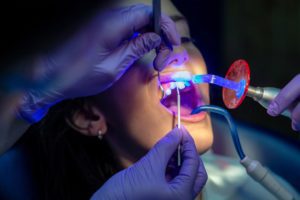Lasers are nothing new to dentistry. However, they may be new to your idea of visiting the dentist. Lasers sound like an idea out of a science fiction movie rather than a tool your dentist uses. On the contrary, dentists use lasers to treat various dental issues. In fact, you may prefer lasers as a part of your dental care after learning more about them.
“Laser” is actually a complex acronym. A laser is a device that utilizes energy from light. The energy is then focused into a beam. Lasers can alter tissues by removing or reshaping them. In dentistry, dentists will use lasers in procedures that treat gum disease, tooth decay, or even whitening teeth. Lasers are minimally invasive. Also, patients report less pain. In fact, the Food and Drug Administration (FDA) has approved lasers for many different dental procedures. This means that they are safe and effective. The benefits of laser dentistry are vast.

Minimally Invasive
Using dental lasers reduces many of the issues seen with normal tools. Lasers are easier for dentists to handle. Additionally, they are far more efficient for long-term use. Also, lasers reduce pressure and vibration compared to other tools like drills. This allows for a less invasive procedure. In fact, lasers reduce the amount of anesthesia given to patients. These procedures reduce patients’ pain and discomfort. Altogether, this means an overall improved dental experience.
Less Bleeding and Infection
Another benefit to using dental lasers is the reduction of infection rates and bleeding. Lasers are beams of light. They cauterize the tissues as dentists use them, reducing blood loss. As the laser opens the tissue, it also stops the bleeding.
Moreover, lasers sterilize and disinfect. This helps to reduce the risks of infection. This is important for procedures for gum disease or infected teeth. Not only does it remove the existing infection, but it also reduces the spread of infection or complications.
Since lasers minimize damage and reduce inflammation compared to traditional tools, patients experience quicker recovery times.
Less Risk of Complications
Traditional dental tools can be clunky compared to lasers. Lasers are precise and efficient. Efficiency means there is generally less risk of damage to healthy areas. While there are risks with any procedure, dental lasers are less likely to break healthy teeth.
Using dental lasers also reduces the amount of time that patients are in the chair. In addition, dentists can shorten procedure times by using a tool that does many things. Lasers are essentially multi-tools. Dentists can use lasers for a variety of dental procedures. Overall, they are multi-functional.
Due to their nature, lasers lessen patient pain. Patients report less pain and discomfort when they have procedures with lasers. They are less likely to need to return for other procedures. Regular dental tools can cause other issues. Lasers lessen complications with general processes. Patients have smaller chances of discomfort. Overall, lasers can get patients back to their regular routines quicker and with less pain.
